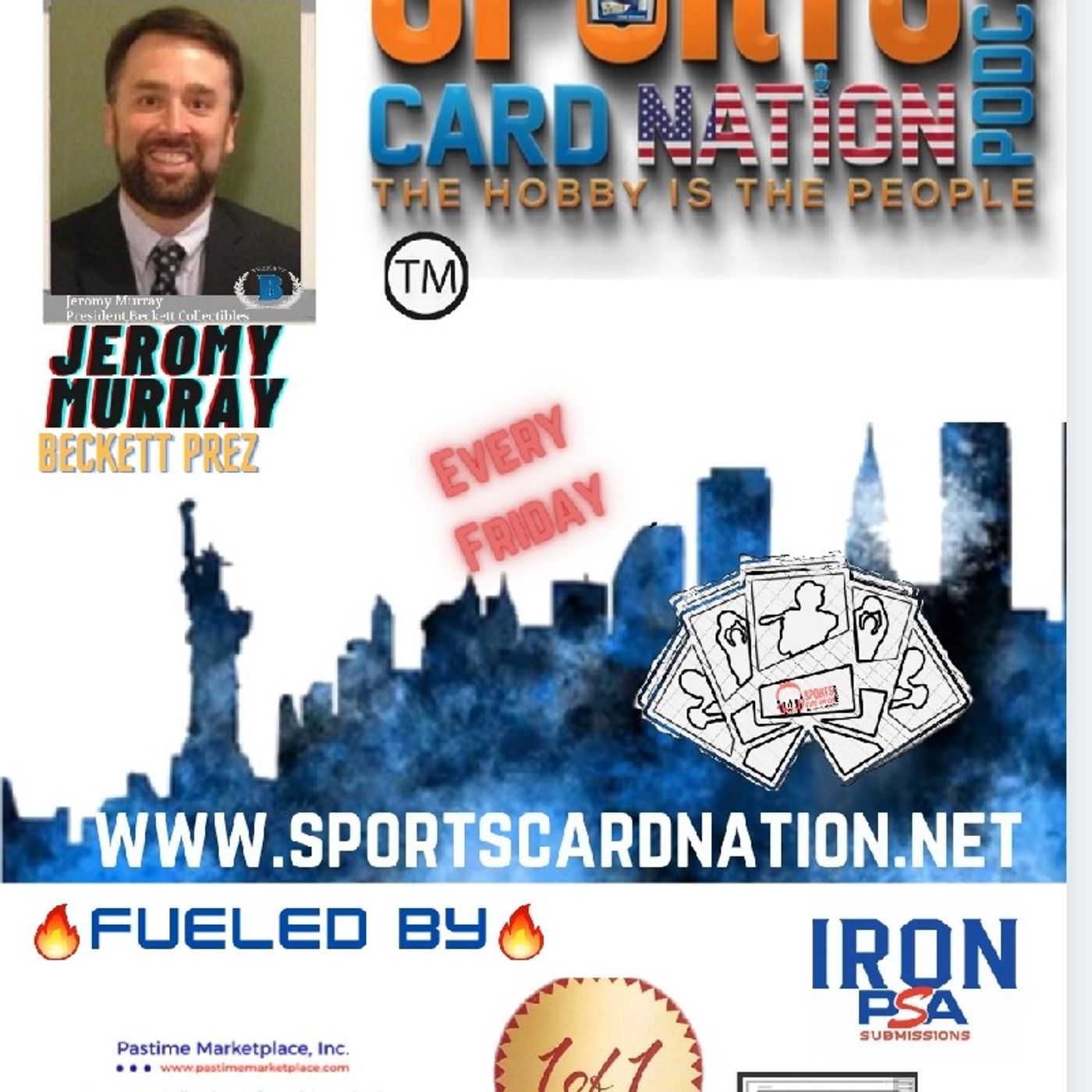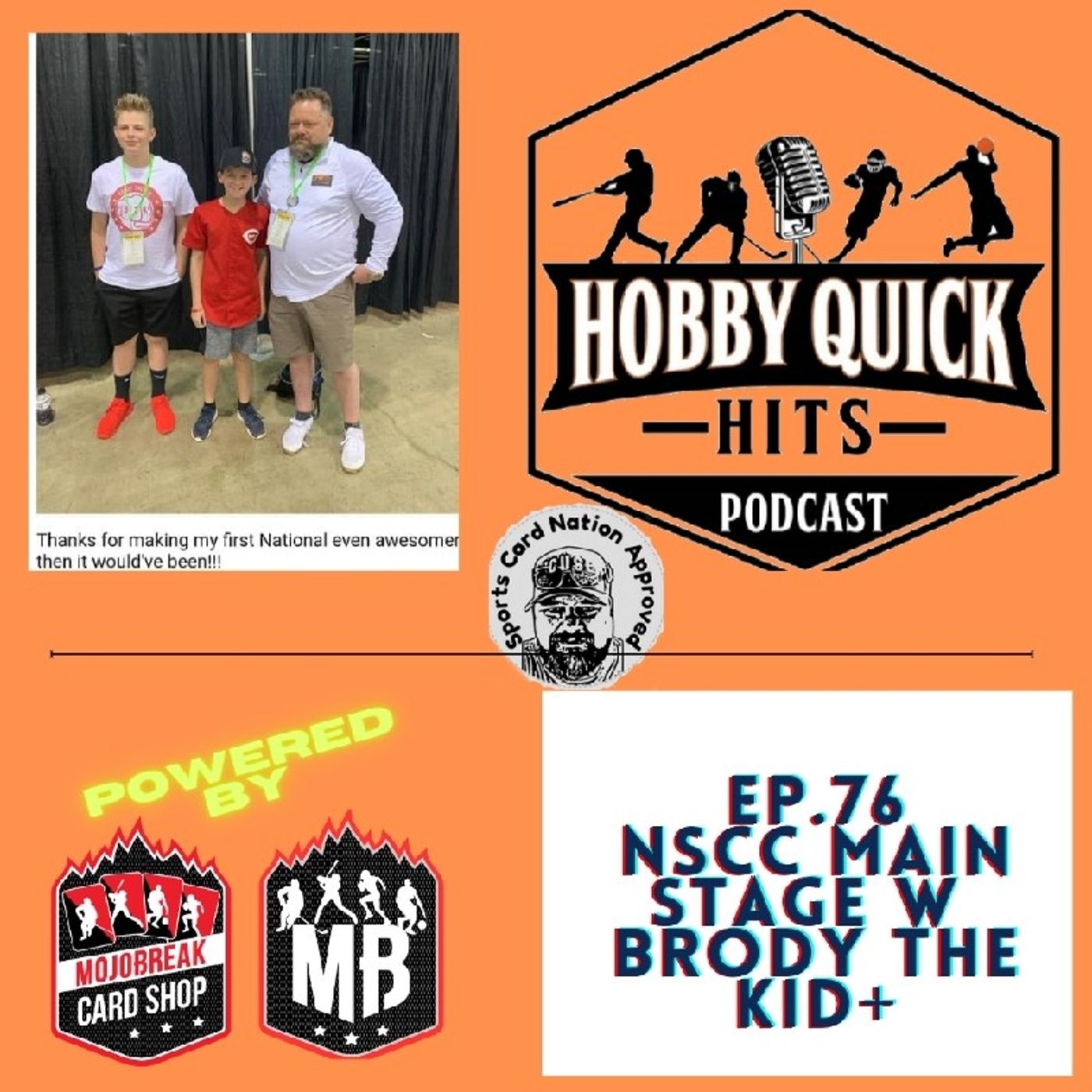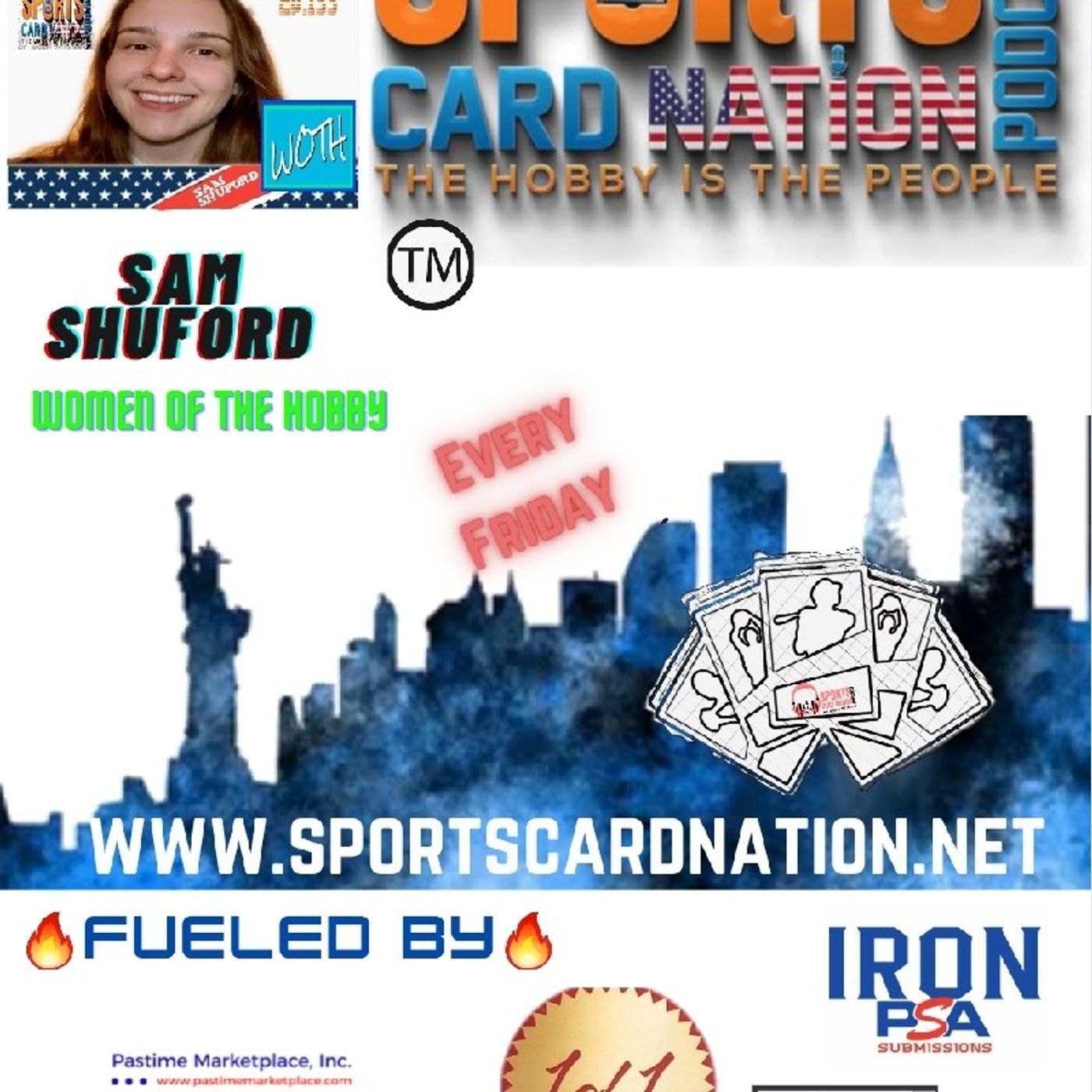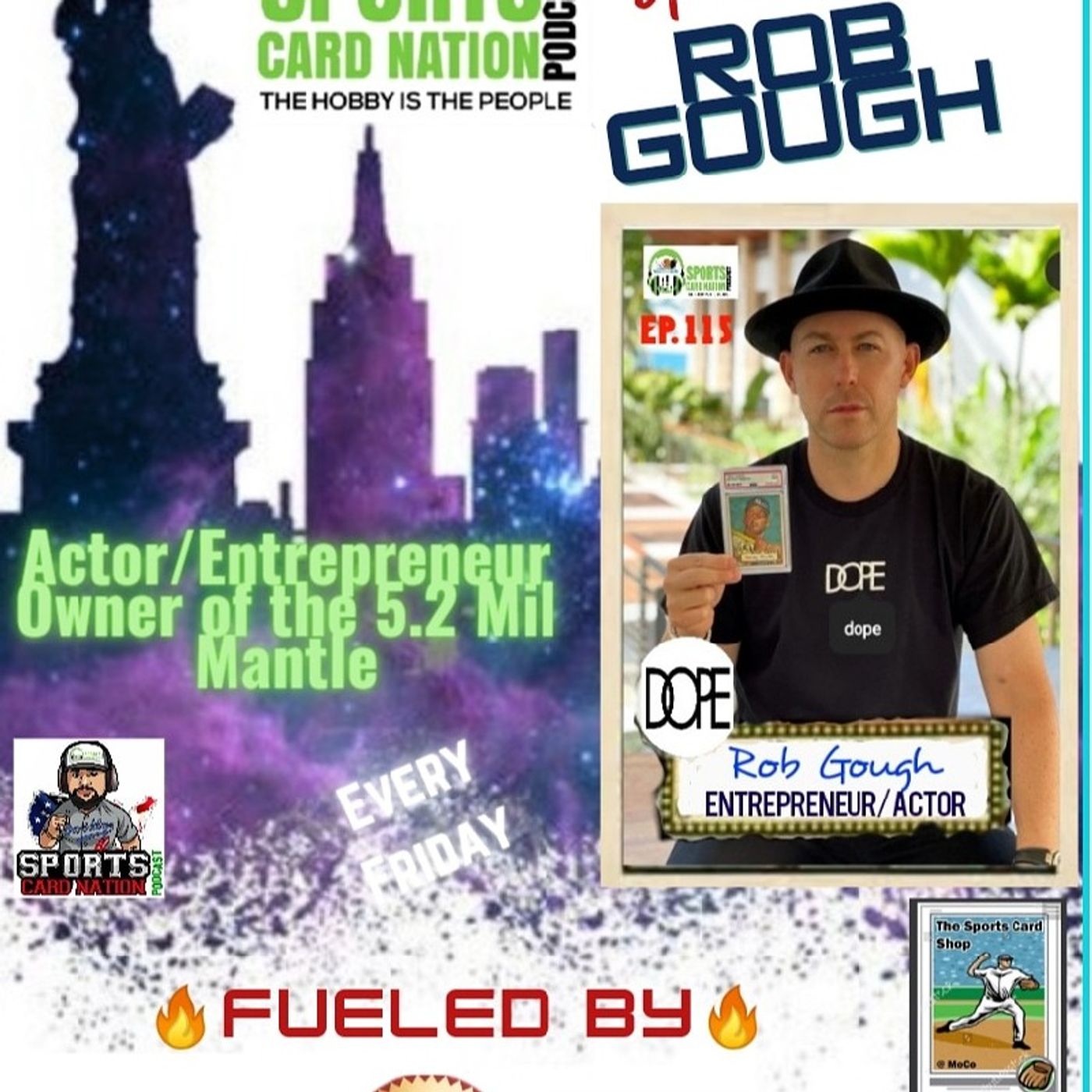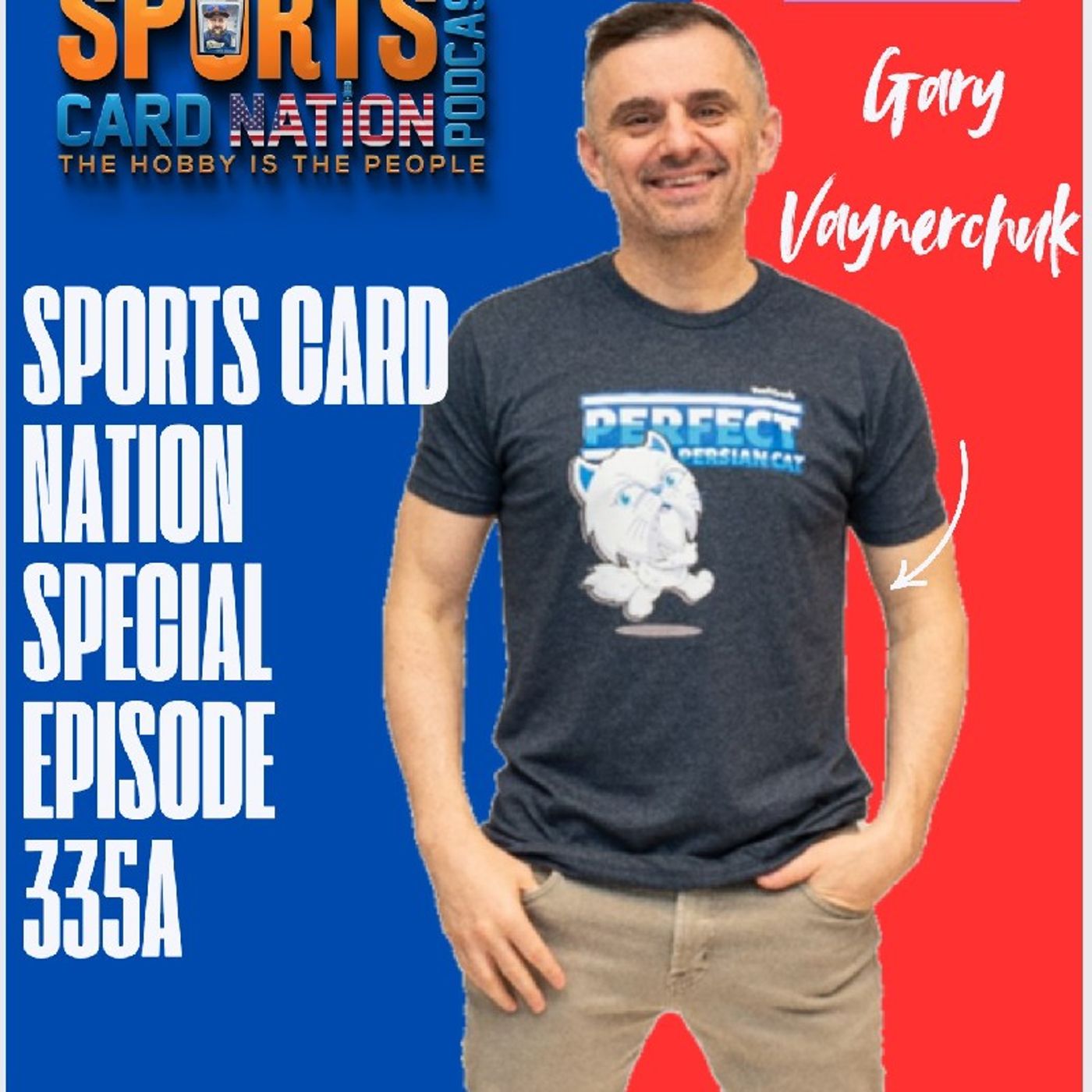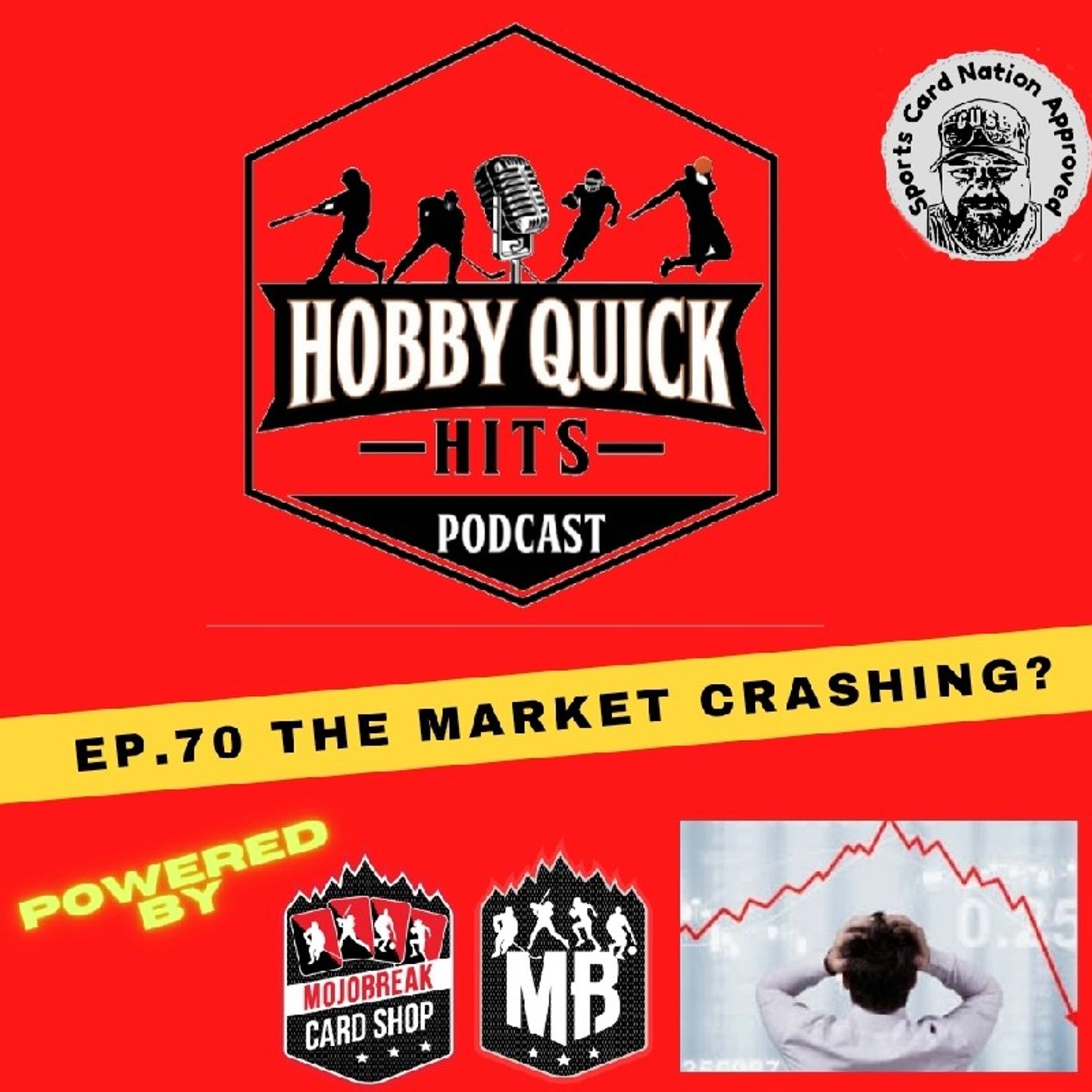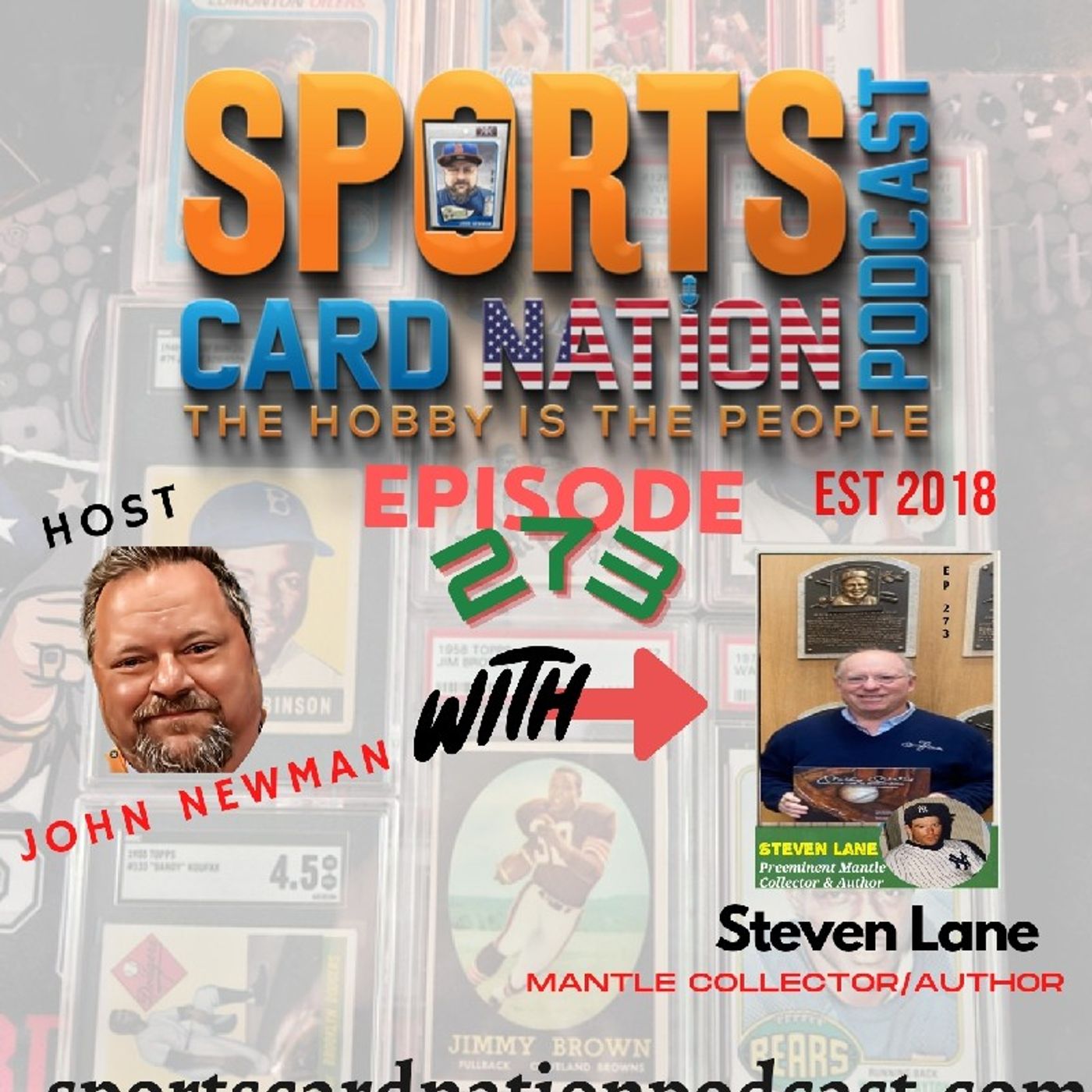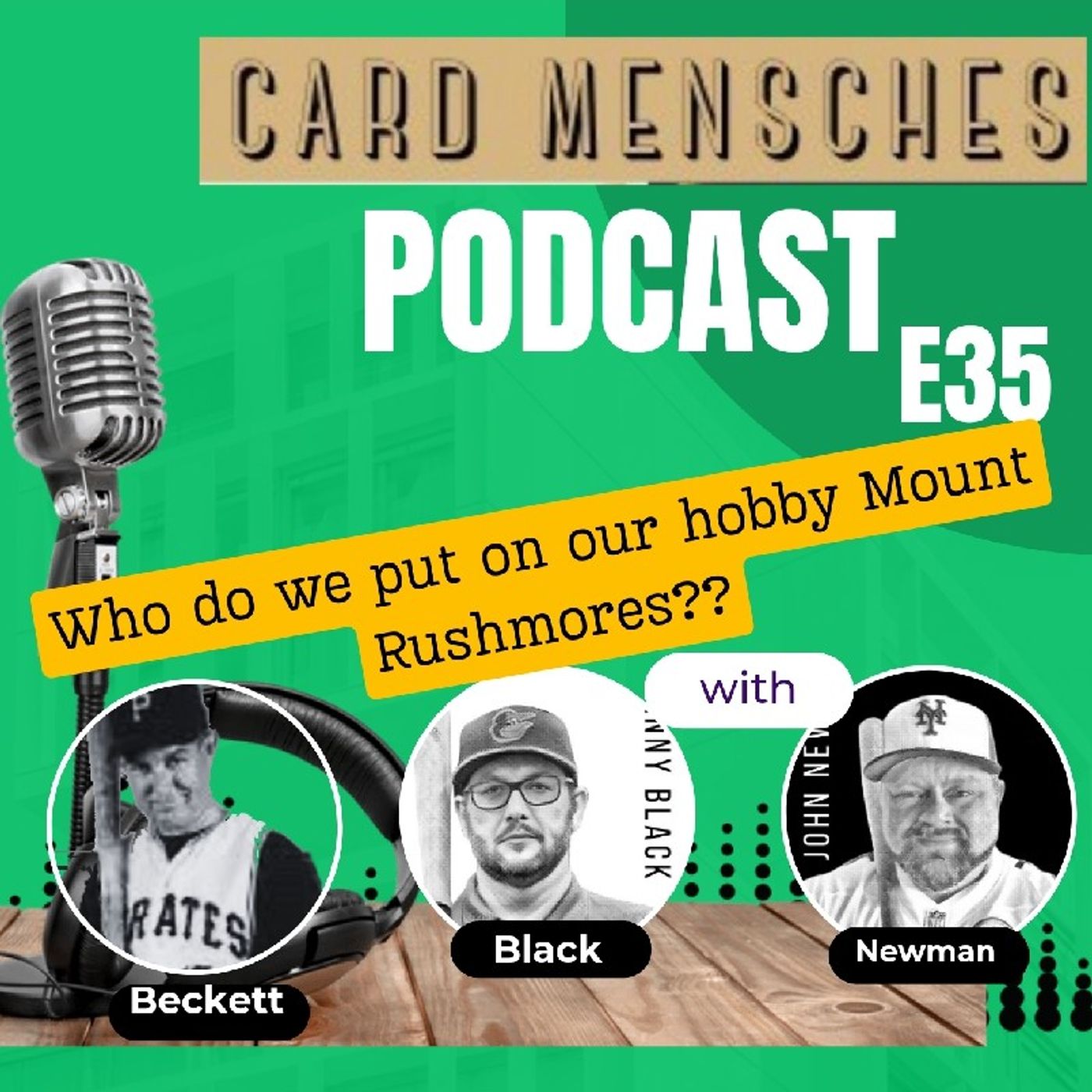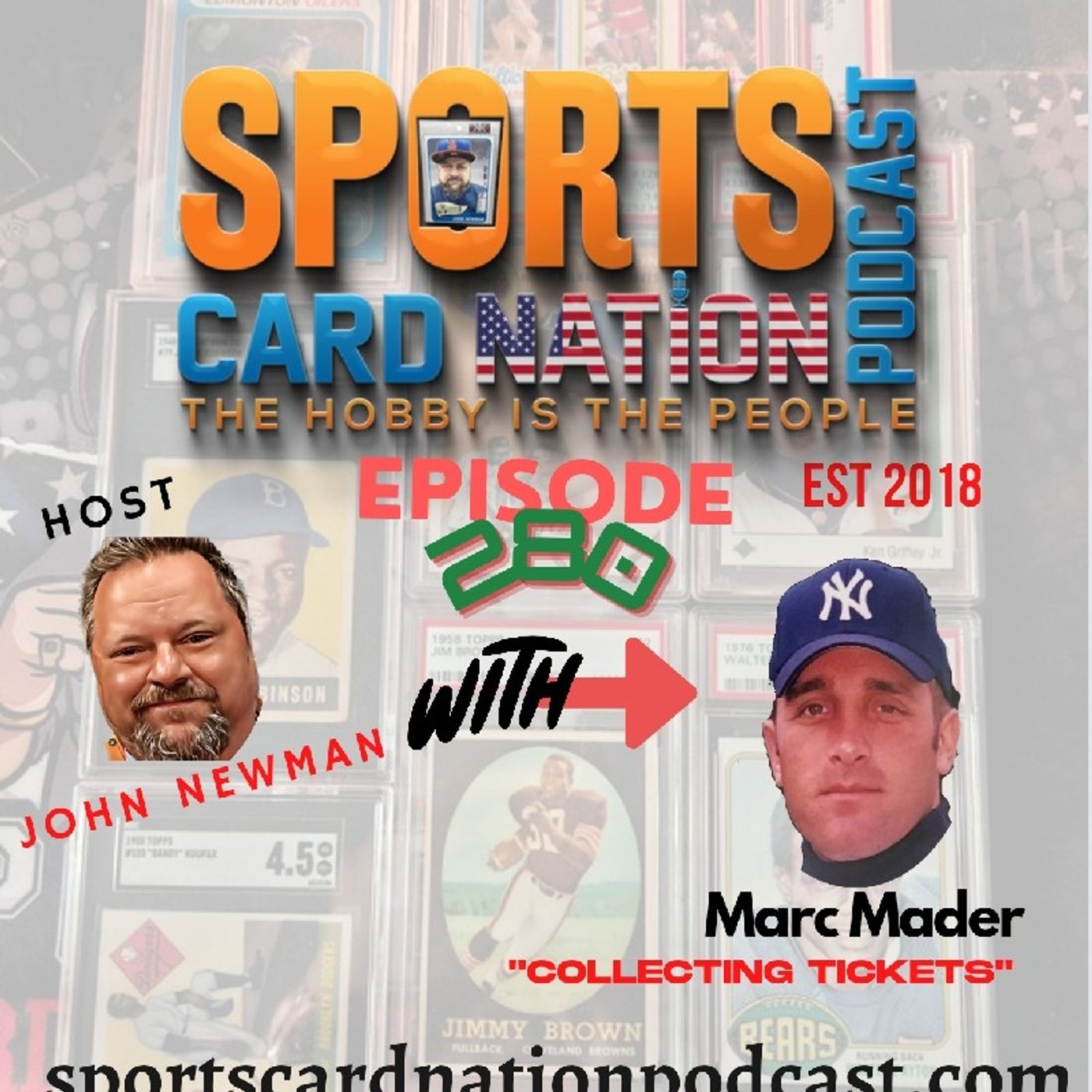Erik Myers returns! E348
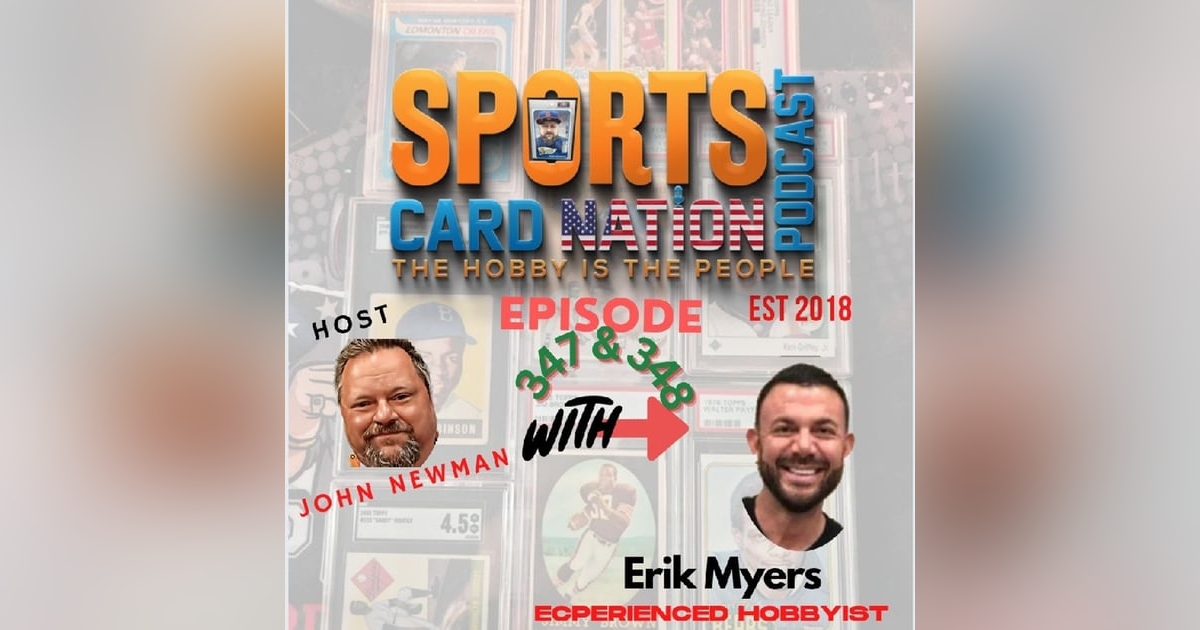
Erik Myers knows the hobby and he knows life and he now navigates both terrains with a vast knowledge. He returns this week for the conclusion of last week's conversation.
Talking points on this episode may include:
*Hobby beginnings
*The Hobby overseas
*Navigating the Hobby safely
*Wearing different hobby hats
*Thinking Long term
*His Redemption story
Follow us on Social Media:
Website:
https://www.sportscardnationpo....com
https://linktr.ee/Sportscardna...
Merch shop:
https://sports-card-nation.pri...
To eliminate pre & post-roll ads
https://www.spreaker.com/podca...
Sports Guardations Hobby is the people. Wheely News and Interviews. It's your number one song. Sports Garnations Hobby is the people.
Spats Guarnation, What is up? Everyone? Welcome to Episode three forty eight Sportscardination. The National is complete and in the books if you attended, I hope you had a great time. I hope you had safe travels back home wherever that may be. Hope you got everything you hope to obtain and had a great trip.
And you know, I'm recording this before you know, I'm even left for the National. I'm kind of bunting stuff up and I hope the same for myself. And you know, it's a great event. I enjoyed going and try to go every year.
I don't know if I'll be able to do it all the time. I think I'm on six straight, but you know, life happens sometimes, as we all know. But so far, so good. Part two of our Great Conversation with Eric Myers.
And Eric Myers has you know, got a great collection. He's worked in the hobby for a few different entities, but he's human like us, and he's sharing some of that human element. I think we can we can learn. We can learn from everybody, right, but we can definitely learn from Eric and very forthright, very knowledgeable and appreciated busy guys, so we appreciated him coming on.
And this is part two of our conversation with Eric. If you missed part one, by all means, I'd love it to go back to last week's show and check that out. Our sponsors here Real Quick Iron Sports Cards. Rob does a great job with the Folk sub New York City guy Long Island to be Exact Sports Collectors died just one of the oldest hobby publications still going.
I'm blessed to be able to write for them. Hobby Hotline. We're doing our summer schedule first and third Saturdays of each month, second and fourth in August with the National and Upper Deck. You know, some of the best designed cards and been around a long time in their own rights, so kudos to them.
Shout out to them. So all right, with that being said, it's time to start the show. Now the conclusion of our conversation with Eric Myers, and we're gonna get into you know, I got into drug and alcohol use, you know, and got to a very dark place, including being homeless. How crazy is that to where he is now proving you know, you'll hear me say that potentially can happen to anybody, right, And so again he's going to share some of that and you know how he you know, overcame odds to to get out of that, stay clean and build a great reputation and a great business.
So that's we're going to start there. I know, you know, you've talked about it on your social media, You've talked about it a little bit even on other shows. You you battled some some personal demons to to get to where where you are now. I love redemption stories.
I have, you know in my family, I have, thankfully a redemption story. Uh, you know for the deep as you want to take you out to spend you know, spend a lot of time, it's your story. I don't want to, you know, put you in a what kind of talk about you know, being at that point and then you know, obviously in a different point. Now.
Yeah, March will be nineteen years. I have been clean March thirte congratulations. Yeah, off drugs. I mean I drink occasionally, so I never really had a drinking problem.
Yeah, So it was just a substance issue. But it was it was basically every substance. The methamphetamines was unfortunately the one that really hung on to me the longest, and it took everything from me. It took my parents and my family and my friends.
It took every dollar I owned, It took it took the socks off my feet. It left me homeless living under a bridge outside after going in and out of jail for you know, it's collectively probably been a couple of years there. If you add it up, I think it was five Elani seventeen arrests somewhere around that area. And it it broke me to complete I mean internally, psychological, physical, spiritual poverty.
Way to say it, it broke every aspect of me that known demand that you could think of, to the point where I was homeless living under a bridge, like truly living under the I forty five bridge. It's an area called Tense City in downtown Dallas, and it I never it's difficult. I think that that was harder than the military by far, being almost because it's not only a self reflection of where you took yourself, but you also need to see how other people treat you at your lowest you know, there's another side of humanity people don't see unless you're in that area. I mean, it was literally for two years, eighteen months a month, the only time people looked at me was just spiting me, spit in my face or tell me to f off like that was it Like that was people just don't care at that level.
And so I think that's a hard thing to deal with even today. So that's why I still to this day I do volunteer work and service work and social work. Just it still helps me digest that part of that was the moments of my life. But thankfully, after hitting bottom, was able to to get clean and to join the military.
Now I was only clean for a little bit before I joined the military. I was fortunate enough to have that opportunity, and that it was an opportunity I wasn't gonna let go of. But now I still I still work a lot with recovering addicts. I'm going to start writing a book here soon on that on that adventure, and it.
Was probably. I'm not going to say I wish things would have been different, but it was very eye opening. It was definitely scary. It was probably the scariest of my life.
It's very hard to believe. It's I don't want to say post traumatics stress, but it's still very difficult for me on a daily basis to see that where I'm at, I still work at a level to where I think I was homeless Monday. There's still little things in my life that are odd when I pack up, like when I when I go to the National this year, right when I travel, I usually travel with two to three times more socks. So if I'm gone for five days, I'll probably pack twelve to fifteen pair of socks.
And it's you that way to make you feel a little bit better, Eric, I do that with shirts, and like you know it, then you wind up getting free shirts on top of that from different So I like, why do I pack somebody somebody shirts? But for me, it's because there was a time I went there was probably six to eight month period there that I didn't when I was homeless, I didn't own socks. So it's it's stu And it's weird because like people don't know those parts about me, you know, So I'm so o city about it. Even though I know that I'm not in that situation, my body still acts and behaves as if you. Better take those because you just never know.
And it's been twenty years. Almost, you know, So it's it's really it's strange, you know, but yeah, and I enjoy being able to help other people get out of that situation. I think one of the things I enjoy most is being able to tell people that they can truly make out of their life whatever they want. And I think that there's a large part of society that just goes along with the norm and that there's nothing wrong with that if that's what you want to do, but you're not beholden to that, You're not beholden to that mentality.
Especially with today, you have a supercomputer in your pocket. You can learn anything you want as fast as you want and extract it, whether it's stocks, cryptocurrencies, cards, collectibles, it can be sports cards, Pokemon TCG. It can be watches, it could be anything, right, So there's no limit to what the human can achieve economically, regardless of where you came from. So I think it's I've seen people that are my friends that are in the early twenties, that I met them when they were fourteen or fifteen, and now they're a millionaire.
From collecting, but ultimately it derives from believing in themselves, to taking that chance, to chasing that dream, and to kind of walk in the lonely road. Because if you think about it, if you're going to go all in on yourself to sports cards or cryptocurrencies or stocks at the age of fourteen, fifteen sixteen, maybe not so much stocks cryptocurrencies because it's socially acceptable. In this aspect of cards and collectibles, I think it can be a lonely road. So people kind of got to take off and walk that road on their own.
And but that'll probably be the best lonely road you'll ever walk. And you'll look around a couple of years later and you're you're up here and all the people in your peer group are down here economically, and you've learned how to fail, you learn how to succeed. You've lost money, you've made money, You've learned how to deal with the emotional stress of both of those. Right, because you make good money, you know you're maybe not acting the same way you used to act.
You know you don't maybe don't you need to have those bruises on your head and learn how to accept the highs. But also learn how to accept the lows when you lose ten twenty fifty thousand bucks, you know, and find that even kill self because that's really where you lie in the middle of that. You know, that's where you should be. Well, kudos kudos on a couple of fronts here, Eric, for you know, getting yourself out, you know, like you said, staying clean, congrats on nineteen years.
And then you know that's an accomplishment in itself, right, and then now in turn, trying to help others do the same through your experience, right, I mean, I think you would agree like that stuff. While you really have to be driven yourself to want to get better and get out of that, you know you do have help along the way, and you're trying to do that for others, right, you could be the difference and whether that happens and that and you don't have to do that, right, You could just sort of live your life without doing that, and you wouldn't be wrong necessarily. So I think it's it's special to to continue to try to help others. And who knows better what someone like that's going through right than you, because you've been there sort of done that.
And I think that there's a lot to be said that I know. I talked to you before we start recording about Randy Lurks, former Major league pitcher who was alumnus of the show, and he's doing the very same thing. And I don't think that's easy to do. It might maybe sometimes people will do that make it look easy, but I don't think it's it's easy.
So I don't have a had on. But but hats off to you and others who who do that. I think it's important. Yeomen's work and makes it could make it could be a difference maker in someone's survival.
Not to be dramatic, but it could be that it's important, but work. So thank you. You are listening to the sportscard Nation podcast. We'll be right back after this break.
Hobby Hotline is the Hobby's only live, interactive call in show. Join some of your favorite hobby personalities every Saturday, eleven a m Eastern eight am Pacific to discuss the hottest hobby topics. If you miss us live, catch us after the fact on all major podcast platforms. Follow us on socials at Hobby Hotline.
We batch. Kind of moving on to to you know, more hobby stuff. Again, you've lived and traveled a lot. How is I know, it's hard to surmise just in one statement.
Every area is different. But uh, you know in the States are sort of spoiled with the hobby. How is in your travels to overseas in other countries, how is the hobby different? Uh to what we might see here. In every culture is a little different, right, we're more Yeah, Let's say the European culture is probably the closest to the same as here, very very fast, very transactional.
The Asian cultures made a little slower. They're more I noticed when I when I went to Korea, when I when I lived in Korea, when I went to the car shows there a lot of it is more about each other, learning each other's collection. Usually, when you go meet somebody for the first time, you might not want to be so transactional driven. My advice is start asking them about their collection.
Don't discuss pricing, maybe so much unless they offer it up, Unless they start that part of the discussion. In Asia, it's usually kind of how it is. You want to just learn more about them and their collecting habit, and they want to do the same about you. It's more about the relationship building and more about the appreciation of you why you collect what you collect, and you being interested in collecting what they collect.
I find that to me it was a lot more appealing. I like that. I don't get me wrong. There's pros and cons to both aspects.
But I'm just older now, you know. So. I guess if I was younger, maybe I would like the more of the Western culture, where it's just high transaction, hi vol hum and stuff. I think my.
Favorite place that I visited all the places is the Philippines. And I love my Korean brothers and sisters, and Japanese brothers and sisters and all my friends that I met in China and everywhere else. The Philippines was just on the level, it really was. I've got so many people that I've met over there that will be friends for life.
I can't even start to begin to tell people how grateful I am that I've met those people over there. It is probably the greatest blessing that I've ever had to be able to travel the entire world because of this industry. I can go to any country and I have friends there, and it's a very very great experience. I haven't had a chance to go to Middle East yet, I'm really looking forward to that.
But I do think that one thing I want to come about cards is for the most part, maybe things that have changed a little bit over the past couple years, and I hope that they don't continue to go down that road. But for almost my entire collecting experience, regardless of whether you were Republican or Democrat, or however you looked at things in your life religiously or politically, the difference is that most of us have to walk on eggshells in on your regular life. Right, for the most part, that stuff just kind of stayed outside when you went inside to the card show. You know, people didn't really care how you who you voted for, or what your personal beliefs were.
They kind of were unified on the love that we all shared for this industry and this hobby, right, whether that we loved collecting. That took precedence over everything else, that outside of those rooms, these all these other decipis the device that things took precedence, you know, And I really I fell in love with that. I'm forty, I'm forty seven. I have never still to this day, collecting is the purest human experience that I've had, because there are people that are all walks of life that can go in one room together.
And unfortunately, I hear a lot more of the political rhetoric and whatever on social media, and it car shows out. I hope it leaves. But the purest form of human relations that I've ever experienced in my life is on the playground when I was a kid, like when I was five, six and seven, and then cards every because it's where people can just enjoy things together. And I think for humanity there needs to be a better bond than that.
You know, we need to value that and hold onto that as opposed to allowing the negative things in our life to come into that aspect. You know, yet no doubt, Well said, you know, I've always said, Eric, you know, the hobby's just one big fraternity. We may all have different colleges or schools or places we went to, but when we're in the hobby, we all go to that same school, so to speak, or train of thought. Right, we're collecting what we love, We're doing what we love.
We have a passion, whether it's sports based or not. And like you said, I don't think there's a place. I think politics has to be on the outside of that room rather than the inside of that room. I know it's important.
I'm not you know, sweeping under the rug and saying it's not important. But the hobby's an outlet, right, that's something we enjoy, not to you know, politics generally divides people. There will two sides from four sides. You know.
Go ahead, when I go into collecting, when I go into card shows and stuff, I don't even want that to be important. I want it to be non existent, Like I want it to not exist in my life because I have friends from all spectrums. Like I literally have friends from every spectrum that's this visus, and I don't want to look at them any different, Like I really don't. I want to look at them with the same.
Purity and heart that I look at them on a daily basis, you know, because that's I got one shot at this life. Man. You know, if I can't make a difference in other people's life with this one shot, then what am I doing here? Am I just collecting things? You know? Am I just making money? Right? Like? At some point you kind of got to ask yourself, what are you doing here? You know? So, uh, and the best thing you can do is make a difference. Horseman once said you should, and I'm paraphrasing him, he said.
You should. You should be ashamed to die until you made a monumental impact on the betterment of humanity. So I think that always sticks with me, right, like you should continuously be trying to make your monumental impact on whether you're at work or your daily walk or whatever it is you're doing in life, to be trying to make a better impact for the human humanity around you. You know.
But I'm yeah, back to your original question. I'm just grateful to have the experience. I mean, every culture is different, and I wish everybody my top success. I hope everybody gets to go and travel the world and go to card shows.
Go to Germany, you know, go to France, go to Paris, go to the UAE cutter, go to go to the Philippines, go to the They got the card show in Macal, the card show in China. It's every year, go to that thing, you know, take that trip, even if you don't buy anything, even if that's just your vacation. Man, the moments are so worth. It, no doubt.
In the hobby is becoming or it's not becoming. It is a worldwide hobby and it's becoming more so it's probably a better way to say. And nowhere up against the clock a little bit. You've got an incredible autograph collect action.
Uh you know, you read different. You're hearing a lot of stuff coming out about a lot of like the FBI cracking down on some you know rings where there's forgeries going on. Uh, you know your stuff. I know it's hard in just a few minutes.
But for those who are who collect autographs are thinking about doing more of that or getting into it, just some advice as someone who knows what they're doing, uh, in that in that space to be careful and avoid getting burned. Yeah, I would definitely stick to my personal opinion and stick to stuff that's got the highest quality see a way, right, like whether if whether it be P S A, J S A or it depends on depends on the sport, right, depends on the collecting sport. Hupper deck authenticated stuff. To that effect, really do your research, you know, I mean that's very very important.
And if you can, if you're if you're talking about cards, you want something that says in the back of the card. This card is autographed, you know that it's denoted there in person autographs vintage stuff. So I'm a big collector of Baborth autograph stuff. All of my stuff has all of my personal Fabor youth baseballs have at least two, if not three coas.
I think that's very important to try to get as much provenance or not as much providence, as much a certification as you can. That way, it's the more the better. Just do your research, do your studying, ask people that know. Don't be knee jerk reactive.
You know, if the deals too good, sounds like it's too good to be true, it most likely is it's not worth the extra twenty percent gain. Isn't worth one hundred percent risk, that's important. You know, if the items should be worth fifteen grand, the guy's trying to sell to you for seven, you know, maybe it's best to ask the three or four people or just pass. You know, you really got to do your research on the history, and especially if it's cards, go look for historical sales data on those items.
My apologies for some audio issues there, especially on the back end of that conversation, had some in clement weather and effect in the Internet, and you know, got a little spotty there, but I cleaned it up as best as I could. I think it came out considering how bad it was, I think it came out fairly well. So thanks again, Eric Myers. We didn't even get to some of the things on my list, so love to have them back on and kind of talk more and chop up a little more hobby than we did.
But glad to have them and appreciate it. I'm gonna hear from our Hobby is the People Announcer of the Week and wrap up this week's episode time for all. Hobby is the People Announcer of the wage. This is Rob Petrozzo from Rally.
Remind you that the hobby is the people. It's not any corporations or breaks. It's not even for actional companies. It's not any of that.
It's people and the people that make collecting great and make it what it is. If you'd like to be the Hobby is the People Announcer of the Week to one or MP three file and send it to Sportscard Nation DC at gmail dot com. I do wish we could chat Lieger both. I'm having an old fan for dinner.
Bye,.








